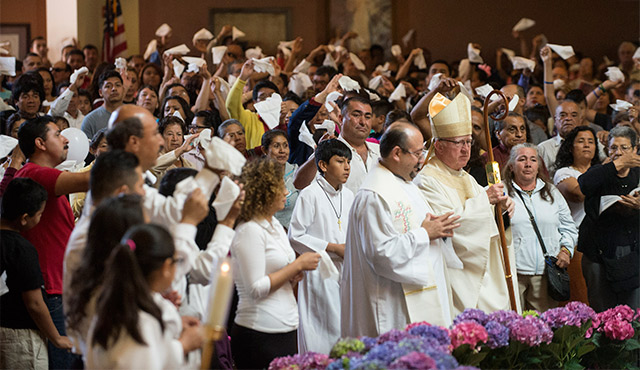When American film’s top honor, the Oscar, was awarded to “Spotlight” earlier this spring, Catholics worldwide were forcefully reminded again of the ongoing need for the Church, its leaders and its members to be vigilant in recognizing, reporting and preventing child sexual abuse, as well as providing support to victims and their families.
Since 2002, when the U.S. Conference of Catholic Bishops developed a blueprint for dealing with the worldwide sexual abuse crisis, every diocese is mandated to guarantee an effective response to allegations of child sexual abuse to ensure the accountability of procedures and to protect the faithful.
It’s fitting during April – National Child Abuse Prevention Month – to acknowledge that the Diocese of Orange is recognized for developing one of the most robust, effective, wide-ranging, transparent and committed measures to address the Church’s child sexual abuse crisis. “Spotlight” and its popularity offer the opportunity to raise awareness of the Diocese’s strong commitment to prevent such situations from occurring again.
“We are serious about keeping kids safe,” says Diocese of Orange Chancellor Shirl Giacomi. “The farther away we get from the scandals of 2002, the more we must keep at this. We want to think that it’s over, but abuse is a terrible part of our society and we must make sure we do all we can to keep kids safe.”
At the Diocese level, Giacomi notes, an auditing firm has verified full compliance with the Bishops’ Charter for the Protection of Children and Young People every year since its 2003 inception. Beginning with its public acknowledgment of past failing and apologies to the victims of abuse and their families, the Diocese has committed to the fair resolution of every legitimate abuse claim.
A toll-free number, 1 (800) 364-3064, has been established to report sexual abuse by clergy or church personnel. As gatekeeper, Assistance Ministry Coordinator Sylvia Palda – a bilingual licensed family therapist – makes sure that calls are answered, refers callers to counselors, and offers support.
“For more than a decade the Diocese of Orange has employed rigorous training programs and thorough background checks for all clergy, parish/school staff, ministry leaders and volunteers,” Palda says. “The 800 reporting line has become a critical part of the Diocese’s efforts to increase awareness and implement protections for the safety and well-being of our children.
“A caller is able to leave a confidential message and request a call back to discuss their concerns and personal experience with any form of sexual abuse that occurred.”
This comprehensive approach to ensuring the safety of young people begins with detailed screenings of more than 75,000 clergy, employees and volunteers, Giacomi says. In 2014, the Diocese trained 286 priests, 115 deacons, 1,664 teachers and more than 25,500 school employees and volunteers in procedures for providing safe environments for children.
An independent oversight board investigates all claims of abuse, and every member of the clergy and all employees have signed the Diocesan policy on sexual conduct, notes Norma Aguero, director of the Office of Child and Youth Protection. Background checks are conducted for all seminarians, priests and religious.
Concurrently, all Diocesan elementary schools and religious education programs have added safety education programs to their curriculum, Giacomi notes. The programs provide age-appropriate education for children as well as information for teachers and parents.
“The two-pronged approach – training of adults and kids – and fingerprint and background screenings, ensures that we are processing and vetting people and eliminating those that don’t meet the criteria,” Aguero says.
Parents, too, must be keenly aware of their children’s activities to recognize and report suspicious activities, Giacomi notes, such as frequent texts from teachers, coaches or any adult after hours, singling out of kids for special gifts, and odd interactions that could indicate the children are being “groomed” by a possible predator.
“It’s never going to go away,” Giacomi says. “This is not a Church, teacher or coach problem. It’s a societal problem. We will reduce the occurrence beginning with the education of our children and the screening of adults. It’s not anything new. We just need to do our job and act upon the safeguards we’ve put into place.”

